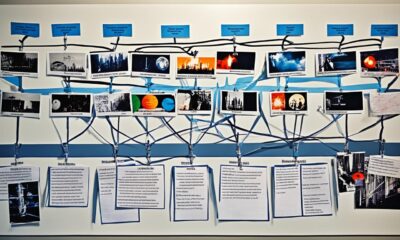Understanding Narcissism
Why Is a Generous Narcissist's Giving Self-Serving?

Understanding why a generous narcissist's giving is self-serving involves recognizing their calculated behaviors, aimed at boosting their ego and maintaining control. These individuals use gifts to manipulate and expect reciprocity, reinforcing their perceived superiority. Generosity is often a façade to elevate their self-image and secure admiration. Such acts lack genuine kindness, serving external validation rather than pure altruism. Recipients may feel undervalued and manipulated due to the self-serving nature of these gifts, impacting trust and well-being. To navigate relationships with generous narcissists, setting clear boundaries and understanding their motives is essential for maintaining emotional health and autonomy.
Key Takeaways
- Generous acts by narcissists serve to boost ego and maintain control.
- Gifts are used as tools for manipulation and to secure admiration.
- Giving serves self-serving motives to reinforce superiority and image.
- Expectations of reciprocity and admiration drive calculated giving behaviors.
- Generosity is a facade to elevate self-image and maintain power in relationships.
Characteristics of Generous Narcissists
Generous narcissists exhibit calculated giving behaviors to assert control and seek admiration in their relationships. These individuals often use generous gifts as a means to manipulate and maintain power over others. The gifts they give aren't purely out of kindness but rather serve their self-serving motives, such as seeking validation and boosting their self-image. When a generous narcissist presents a gift, it's essential to be cautious, as there may be hidden strings attached. These gifts come with expectations of reciprocity or a sense of indebtedness, further solidifying their control over the recipient.
In interactions with generous narcissists, one should be mindful of the underlying motives behind their generosity. While on the surface, their gifts may seem thoughtful, it's important to recognize that their primary goal is to fulfill their own needs for admiration and control. Understanding the characteristics of generous narcissists can help individuals navigate these relationships with a sense of awareness and caution.
Motives Behind Narcissistic Generosity

Narcissists exhibit generosity as a means to boost their ego, seeking admiration and validation from others.
Their gift-giving behavior is motivated by a desire to maintain control and secure continued attention and admiration.
Expensive gifts serve as a tool for narcissists to uphold their self-image and reinforce their perceived superiority.
Ego-Boosting Through Giving
Motivated by the desire to elevate their self-image and garner admiration, narcissists engage in acts of generosity as a means to boost their ego.
- Generous acts serve as a facade to portray a caring and helpful image.
- Excessive giving allows narcissists to feel superior and elevate their status.
- Giving ostentatiously helps them maintain control and power in relationships.
- Narcissistic generosity fulfills their need for attention and admiration, rather than genuine kindness or altruism.
Seeking Admiration and Validation
Seeking admiration and validation, individuals with narcissistic tendencies engage in acts of generosity as a means to elicit praise and control relationships. Their gift-giving isn't driven by genuine care or empathy but by a desire for constant affirmation and admiration.
By presenting gifts, they aim to manipulate emotions and perceptions, ensuring a continuous flow of validation and admiration from others. These gifts serve as tools to maintain their self-image and inflate their ego, rather than stemming from a place of genuine generosity or altruism.
The lack of sincerity behind their gifts highlights the self-serving nature of their actions, ultimately revealing a deeper motive rooted in the need for external validation and control over relationships.
Impact on Recipients' Perceptions

Receivers of generous gestures from individuals with narcissistic tendencies may interpret such acts as strategic maneuvers to elicit admiration and control, potentially leading to feelings of manipulation and indebtedness. When a generous narcissist gives, recipients' perceptions can be shaped by the lack of empathy and the focus on their own needs rather than the well-being of others. The impact on mental health can be significant as recipients may feel conflicted or emotionally manipulated by the giver's intentions. It's essential for recipients to be aware of the potential motivations behind the generosity to make informed decisions about accepting gifts.
- Lack of empathy in the giver can lead to recipients feeling misunderstood or undervalued.
- The self-serving nature of the giving may create a power dynamic that undermines the recipient's autonomy.
- Mental health implications of receiving gifts from a narcissistic individual can include feelings of manipulation and confusion.
- Understanding the underlying motives behind the generosity is critical for recipients to navigate these complex dynamics with awareness and self-care.
Manipulative Nature of Narcissistic Giving

The manipulative nature of narcissistic giving becomes evident in the underlying motives that aim to maintain control and admiration from others. Generous narcissists use their gifts as tools to serve their self-image, constantly seeking validation and admiration from those around them. Their acts of generosity aren't purely altruistic but rather self-serving, with a primary focus on eliciting admiration and loyalty from others.
By creating a sense of indebtedness in recipients, they further solidify their control over relationships and situations. The generosity displayed by narcissists is strategically designed to maintain power and admiration, highlighting the manipulative nature of their giving. This behavior is rooted in a desire for control and validation, rather than genuine care or concern for others.
Understanding the manipulative tendencies behind narcissistic giving can help individuals navigate these relationships with awareness and autonomy, avoiding falling prey to the self-serving motives at play.
Public Vs. Private Generosity Discrepancy

When examining the behavior of generous narcissists, the discrepancy between their public displays of generosity and private actions reveals a significant insight into their self-serving motives. This public versus private generosity dichotomy sheds light on the strategic nature of their giving behavior.
- Image Enhancement: Generous narcissists often use public acts of generosity to boost their image and garner admiration from others.
- Stinginess Behind Closed Doors: Privately, these individuals may exhibit reluctance to give or display a lack of generosity, highlighting the self-serving nature of their actions.
- True Intentions Revealed: The disparity between public and private giving showcases the discrepancy between their outward appearance and genuine motives.
- Manipulative Nature: Understanding this discrepancy is vital in recognizing the manipulative and self-serving aspects of a generous narcissist's giving.
In recognizing the self-serving motives behind a generous narcissist's actions, it becomes evident that their generosity is often a calculated strategy aimed at gaining control and admiration rather than genuine altruism.
Emotional Toll on Close Relationships

Close relationships with generous narcissists can take an emotional toll on recipients due to the underlying dynamics of control and manipulation. The impact on trust can be significant, as recipients may feel obligated to reciprocate the narcissist's gestures.
Understanding these emotional manipulation dynamics is essential in managing relationships with generous narcissists.
Impact on Trust
In relationships with a generous narcissist, trust can quickly diminish due to the subtle manipulative nature of their giving. The impact on trust in these dynamics can be significant and detrimental to the overall well-being of the relationship.
Here are four ways in which a generous narcissist's giving affects trust:
- Recipients may feel manipulated into reciprocating the generosity.
- The sense of indebtedness created by the giving can lead to feelings of control.
- Trust may erode as the giving is perceived as a tool to maintain power and admiration.
- The authenticity of the relationship may be compromised as recipients feel obligated to respond in specific ways.
Emotional Manipulation Dynamics
Generous narcissists strategically wield their giving as a potent tool for emotional manipulation within their close relationships. By using acts of generosity, they create a web of emotional dependence and control over others. These individuals lack empathy, focusing solely on their self-serving motives.
The emotional toll on close relationships can be profound, with recipients feeling a sense of indebtedness that leads to heightened emotional vulnerability. The manipulative dynamics at play cause distress, confusion, and a constant feeling of inadequacy among those involved.
The ongoing cycle of giving and emotional manipulation erodes the well-being and autonomy of individuals within the narcissist's circle. Being aware of these dynamics is essential in maintaining healthy boundaries and safeguarding emotional health in relationships with such individuals.
Setting Boundaries With Narcissistic Givers

Establishing clear boundaries with narcissistic givers is essential to safeguard oneself from manipulation and maintain a healthy relationship dynamic. When dealing with individuals who exhibit narcissistic traits, setting boundaries becomes an important tool for protecting your well-being.
Here are four key points to keep in mind when setting boundaries with narcissistic givers:
- Communicate Clearly: Clearly express your limits and expectations to the narcissistic giver to avoid misunderstandings and manipulation tactics.
- Maintain Independence: Setting boundaries helps prevent feelings of indebtedness or obligation towards the giver, allowing you to maintain your autonomy.
- Reduce Stress: Establishing boundaries can decrease emotional stress by creating a clear framework for interactions with the narcissistic individual.
- Prioritize Well-being: Setting clear boundaries empowers you to prioritize your mental health and well-being, ensuring that your needs are met in the relationship.
Evaluating the Health of Relationships

Evaluating the strength of relationships with generous narcissists involves understanding the underlying motives behind their giving behavior. Understanding the dynamics of a relationship with a narcissistic personality is vital for maintaining one's well-being. Generous gestures from a narcissist may initially seem positive, but it's important to recognize that their giving is often driven by a desire to maintain control and admiration. These gifts can create a sense of indebtedness in recipients, reinforcing the power dynamics within the relationship.
When evaluating the health of relationships with narcissistic givers, it's important to ponder whether their generosity is genuine or if it comes with strings attached. Being aware of the self-serving nature of their giving can help in setting boundaries and protecting oneself from being manipulated. By examining the underlying motives behind a generous narcissist's behavior, individuals can make informed decisions about the level of involvement they choose to have in such relationships.
Frequently Asked Questions
Why Would a Narcissist Be Generous?
We might wonder why a narcissist would choose to be generous.
Narcissists often use generosity as a tool to maintain control and admiration in relationships.
Their giving isn't about genuine altruism but rather to create a sense of obligation in others.
By giving, they aim to secure admiration and obedience from recipients.
Ultimately, a narcissist's generosity serves their own needs for validation and control rather than a true desire to help others.
Are Narcissists Good Gift Givers?
We've to admit, narcissists can be good at giving gifts on the surface. Their flair for grand gestures and extravagant presents can dazzle at first.
But here's the catch—behind those lavish gifts lies a web of manipulation and self-serving motives. Their generosity is a facade, a carefully crafted tool to maintain control and boost their own ego.
What Is a Self Serving Narcissist?
A self-serving narcissist is someone who prioritizes their own needs and desires above others, using generosity as a means of manipulation and control.
Their giving is driven by a desire for admiration and validation, expecting gratitude and obedience in return.
This behavior helps them maintain their self-image and secure power in relationships.
It's important to recognize these traits to protect oneself from potential harm or exploitation.
Why Would a Narcissist Give You Money?
We give money to exert control and foster dependency. It's a tactic to maintain power and admiration.
By handing out funds, we strengthen our self-image and superiority. Money becomes a tool for manipulation and influence.
Our giving isn't about genuine generosity but rather about serving our own interests. It's a way to assert dominance and reinforce our perceived importance in the relationship.
Conclusion
To sum up, while generous narcissists may appear altruistic on the surface, their giving is often driven by self-serving motives. It's important to recognize the manipulative nature of their generosity and set boundaries to protect oneself from emotional manipulation.
Remember, just like a wolf in sheep's clothing, a generous narcissist's giving may not always be what it seems. Stay vigilant and prioritize your own well-being in relationships with such individuals.
Covert Narcissist
What Makes a Covert Narcissist Different from an Avoidant?
Analyze the intricate behaviors of a covert narcissist or avoidant individual, unraveling the fine line between self-absorption and emotional distance.

The saying ‘actions speak louder than words’ is particularly relevant when differentiating between a covert narcissist and someone with avoidant tendencies within the realm of character traits. The specific behaviors exhibited by individuals with these personality types often cause uncertainty regarding their true motivations and intricate emotions.
As we navigate through the intricate web of characteristics and relational patterns associated with these traits, a deeper understanding of the driving forces behind each persona unveils a fascinating journey into the complexities of human behavior.
Key Takeaways
- Covert narcissists manipulate through gaslighting, lack empathy, and have fragile self-esteem.
- Avoidant individuals fear rejection, struggle with intimacy, and have difficulty expressing emotions.
- Differentiate between covert narcissists and avoidant individuals to navigate relationships effectively.
- Setting boundaries and practicing self-care are crucial in managing interactions with these individuals.
Understanding Covert Narcissistic Behaviors
In understanding covert narcissistic behaviors, it's crucial to recognize the subtle manipulation tactics employed by individuals who exhibit this personality trait. Covert narcissists often display an avoidant attachment style characterized by a strong need for admiration and a lack of empathy towards others. This attachment style stems from underlying feelings of inadequacy and a fragile self-esteem, leading them to seek validation through controlling and manipulating others.
Individuals with covert narcissism may use tactics such as gaslighting, where they distort reality to make their victims doubt their own perceptions and memories. By eroding their victim's sense of reality, covert narcissists gain power and control over them. This manipulation is a key feature of their narcissistic behavior, allowing them to maintain a facade of superiority and self-importance.
Understanding the interplay between avoidant attachment styles and narcissism is crucial in identifying and dealing with covert narcissistic behaviors. By recognizing these subtle manipulation tactics, individuals can better protect themselves from falling victim to the harmful effects of covert narcissists.
Signs of Avoidant Personality Traits

Having understood the manipulation tactics of covert narcissists, it's imperative to recognize the signs of avoidant personality traits that often accompany such behaviors. Avoidant individuals may exhibit the following characteristics:
- Avoidance of intimacy and emotional closeness in relationships.
- Fear of rejection and low self-esteem leading to social withdrawal.
- Difficulty expressing emotions and reluctance to seek help or support.
- Preferring solitary activities and avoiding social interactions.
These traits can stem from various factors, including childhood attachment patterns. Individuals with avoidant attachment styles may struggle with forming secure emotional connections due to past experiences. This can lead to a tendency to withdraw from relationships to protect themselves from perceived rejection or vulnerability.
Understanding these signs can help differentiate between covert narcissistic behaviors and avoidant personality traits, shedding light on the complexities of interpersonal dynamics. Furthermore, recognizing these patterns can aid in addressing underlying issues and fostering healthier relationships.
Impact on Relationships
The impact of avoidant personality traits on relationships can manifest in various ways, affecting both individuals involved. Avoidant individuals often struggle with forming secure attachments, which can lead to challenges in establishing and maintaining healthy adult relationships. Let's delve into the specific impacts on relationships through the table below:
| Impact on Relationships | Description |
|---|---|
| Difficulty with Intimacy | Avoidants may have difficulty opening up emotionally, leading to a lack of intimacy in relationships. |
| Fear of Rejection | Due to their fear of rejection, avoidant individuals may push partners away or avoid commitment altogether. |
| Communication Issues | Avoidants often struggle with effective communication, leading to misunderstandings and conflicts in relationships. |
Understanding these impacts is crucial in navigating relationships with individuals exhibiting avoidant traits. It's important to differentiate between avoidant behaviors and narcissistic personality disorder, as the underlying motivations and dynamics in relationships can vary significantly.
Differentiating Covert Narcissists and Avoidant Individuals

Upon examining the distinct characteristics of covert narcissists and avoidant individuals in relationships, it becomes evident that their behaviors and underlying motivations diverge significantly. When differentiating between covert narcissists and avoidant individuals, several key points emerge:
- Covert narcissists excel at masking their true intentions, seeking admiration and control, while avoidant individuals are more inclined to shun intimacy due to fear of rejection.
- Covert narcissists often employ false humility to garner trust and sympathy, whereas avoidant individuals may struggle with self-esteem and play down their accomplishments.
- Covert narcissists actively seek attention and manipulate situations to be the center of focus, while avoidant individuals prefer to evade attention and remain in the background.
- Covert narcissism is characterized by an unquenchable thirst for admiration and a tendency towards manipulation, whereas avoidant individuals harbor a deep-rooted dread of rejection and encounter difficulties in establishing intimate connections.
Understanding these distinctions can aid in recognizing and navigating relationships with individuals who exhibit traits of either covert narcissism or avoidance.
Coping Strategies and Setting Boundaries
To effectively navigate relationships with individuals displaying traits of covert narcissism or avoidance, implementing and maintaining clear boundaries is essential. When dealing with covert narcissists or avoidant individuals, establishing boundaries helps protect against manipulation and emotional harm.
It's crucial to clearly communicate your limits and expectations to maintain a healthy dynamic. Additionally, practicing coping strategies such as self-care, assertiveness, and seeking support from trusted individuals like friends, family, or therapists can aid in managing interactions with these personality types.
Prioritizing self-care activities that bring joy and fulfillment can help in maintaining emotional well-being. Learning to assertively express needs and feelings without fear of manipulation is key in setting boundaries with covert narcissists or avoidant individuals.
Limiting contact with these individuals when possible can also safeguard emotional health and reinforce boundaries. By incorporating these coping strategies and setting clear boundaries, one can navigate relationships with covert narcissists or avoidant individuals more effectively.
Frequently Asked Questions
Am I Avoidant or Narcissist?
We often question our behavior and tendencies, wondering if we fall into certain psychological categories. It's natural to reflect on our actions and personalities, seeking to understand ourselves better.
Identifying whether we exhibit avoidant or narcissistic traits can provide insight into our emotional patterns and relationships. Self-awareness is a key step in personal growth and development, allowing us to address areas where we may need to make positive changes.
What Can Be Mistaken for Covert Narcissism?
When examining behaviors that can be confused with covert narcissism, it's crucial to consider traits like introversion, shyness, or social anxiety. These characteristics may manifest similarly to covert narcissistic tendencies, such as avoiding social interactions or seeking validation through subtle means.
Understanding the nuances between these traits is essential in accurately identifying covert narcissism and differentiating it from other personality traits or disorders.
What Are the Red Flags of a Covert Narcissist?
When assessing potential red flags of covert narcissism, observing patterns of behavior is crucial. Look for signs of manipulation, lack of empathy, grandiosity, and a constant need for admiration.
Pay attention to how they interact with others, especially in social settings or when faced with criticism. Keep an eye out for subtle but persistent displays of entitlement and a tendency to exploit others for personal gain.
These behaviors can indicate underlying narcissistic traits.
What Hurts a Covert Narcissist the Most?
Criticism or rejection can deeply wound individuals who seek external validation, control, and admiration.
Failure to manipulate or threats to their grandiose fantasies can also trigger intense hurt.
Such individuals may struggle with feelings of inferiority, invisibility, and a fragile self-image.
Understanding these vulnerabilities can shed light on what truly affects them at their core.
Is the Behavior of a Covert Narcissist Related to Their Constant Illness?
The covert narcissist’s constant sickness may be a manipulation tactic to garner sympathy and attention. By portraying themselves as perpetually unwell, they seek to control others’ perceptions and elicit constant care and attention. This behavior aligns with their need for admiration and validation, perpetuating their narcissistic traits.
Conclusion
In conclusion, navigating relationships with individuals exhibiting covert narcissistic behaviors or avoidant attachment can be challenging. It's like walking a tightrope, balancing between their need for validation and fear of intimacy.
Setting boundaries and practicing self-care are crucial in maintaining healthy interactions with these personality types. Remember, understanding their underlying motivations can help in managing expectations and protecting your emotional well-being.
Chris brings a wealth of knowledge and personal experience to the role of Expert Author. With a focus on narcissistic personality disorder and recovery processes, Chris’s articles offer a mix of expert analysis, personal anecdotes, and actionable advice. Their work enriches our platform with depth, authenticity, and a perspective that resonates with those who have experienced narcissism firsthand.
Narcissism Test
Discover Your Inner Narcissist: You Quiz
Intrigued to uncover hidden traits? Take the 'How Narcissist Are You Quiz' and delve into the spectrum of narcissistic tendencies.

Have you ever thought about how self-awareness can shed light on different aspects of our personalities in our everyday interactions? Do you ever wonder how your level of self-reflection compares to that of others?
The 'How Narcissist Are You Quiz' unveils a spectrum of narcissistic tendencies that might surprise you. Let's explore how this quiz can offer a glimpse into our psyche and potentially challenge our perceptions of self-image.
Key Takeaways
- Online quizzes are not diagnostic tools for narcissistic personality disorder.
- Self-reflection allows introspection and analysis of actions, thoughts, and emotions.
- Analyzing conduct provides valuable insights and fosters healthier relationships.
- Seek guidance from mental health professionals for understanding and addressing tendencies.
Understanding Narcissism Through a Quiz
Exploring narcissism through a quiz can provide insights into the traits associated with narcissistic personality disorder. Narcissistic traits such as grandiosity, lack of empathy, and manipulation are often fundamental aspects of this disorder. By engaging with a narcissism quiz, individuals may gain a better understanding of these characteristics and how they manifest in their own behavior.
While such quizzes can serve as a preliminary screening tool, it's essential to recognize their limitations. Online quizzes aren't diagnostic tools and shouldn't be solely relied upon for a definitive diagnosis of narcissistic personality disorder. Instead, they can prompt individuals to reflect on their behaviors and seek further evaluation from mental health professionals if necessary.
To truly comprehend the complexities of narcissistic personality disorder, one must undergo a comprehensive assessment by a qualified specialist. Seeking professional help is crucial for an accurate diagnosis and the development of an appropriate treatment plan tailored to the individual's specific needs and circumstances.
Self-Reflection on Narcissistic Behaviors

After considering the limitations of online quizzes in diagnosing narcissistic personality disorder, it becomes imperative to engage in self-reflection on our own behaviors that may align with narcissistic traits. Self-reflection allows us to introspect and analyze our actions, thoughts, and emotions for signs of narcissistic tendencies. To aid in this process, a structured approach can be helpful. The table below outlines key behaviors associated with narcissistic personality disorder for self-assessment:
| Narcissistic Behavior | Description | Self-Reflection |
|---|---|---|
| Grandiosity | Exaggerated sense of self-importance | Have I displayed an inflated ego? |
| Lack of Empathy | Difficulty understanding others' feelings | Have I been insensitive to others' emotions? |
| Need for Admiration | Constant seeking of praise and admiration | Do I constantly seek validation from others? |
| Sense of Entitlement | Belief in special treatment and privileges | Have I expected special treatment in situations? |
Analyzing our conduct through this lens can provide valuable insights into our personalities and help in fostering healthier relationships.
Exploring Narcissistic Tendencies Together
Together, we'll delve into the manifestations of narcissistic tendencies within interpersonal relationships to enhance our understanding and foster a supportive environment for growth.
When exploring narcissistic behaviors in relationships, it's crucial to distinguish between normal self-interest and the traits associated with Narcissistic Personality Disorder (NPD). Individuals with NPD often exhibit a grandiose sense of self-importance, a constant need for admiration, and a lack of empathy for others. These characteristics can significantly impact how they interact with those around them, leading to strained relationships and emotional distress for both parties involved.
In today's digital age, social media platforms can amplify narcissistic tendencies, providing individuals with NPD a stage to seek validation and attention on a broader scale. The instant gratification and validation received through likes, comments, and followers can fuel their narcissistic traits, reinforcing their belief in their superiority and entitlement.
Assessing Your Narcissistic Traits

Within interpersonal relationships, understanding and recognizing one's narcissistic traits is essential for fostering personal growth and maintaining healthy dynamics. When assessing your narcissistic tendencies, it's crucial to approach the evaluation with a reflective and open mindset. Here are some key points to consider:
- Causes of Narcissistic Personality: Delve into the root causes that may have contributed to the development of narcissistic traits, such as childhood experiences or past relationships.
- Consulting a Mental Health Professional: Seeking guidance from a mental health professional can provide valuable insights and support in understanding and addressing narcissistic tendencies.
- Inflated Sense of Self-Importance: Reflect on instances where you may have exhibited an inflated sense of self-importance or a constant need for admiration from others.
- Impact on Interpersonal Relationships: Evaluate how your narcissistic traits impact your relationships with others and consider the feedback you receive from those around you.
- Self-Reflection and Growth: Engage in self-reflection to identify areas for personal growth and work towards cultivating healthier relationship dynamics.
Insights Into Your Personality: The Narcissism Quiz
The Narcissism Quiz provides a structured assessment tool to evaluate narcissistic behaviors and offer insights into one's personality. By answering a series of multiple-choice questions that reflect narcissistic tendencies, individuals can gain a better understanding of their own behavior patterns.
This quiz isn't a diagnostic tool for Narcissistic Personality Disorder (NPD) but can help determine whether certain traits align with narcissistic characteristics inspired by Greek mythology.
The results of the quiz are anonymous, allowing participants to reflect on their responses without fear of judgment. It's essential to approach the findings with an open mind and consider seeking guidance from a mental health professional if concerns about narcissistic traits arise.
Frequently Asked Questions
How Do You Check if You Are a Narcissist?
We assess narcissistic tendencies by reflecting on our behaviors, thoughts, and interactions with others. Observing how we prioritize our own needs over those of others, seek excessive admiration, or lack empathy can provide insights.
Engaging in self-reflection, seeking feedback from trusted individuals, and considering professional evaluation are valuable steps in evaluating potential narcissistic traits.
Awareness and willingness to address these aspects can be crucial for personal growth and healthier relationships.
What Is the One Question to Identify a Narcissist?
We can identify a potential narcissist by asking if they believe they're more special or unique than others. A resounding 'yes' to this question may indicate narcissistic tendencies.
It's important to distinguish between healthy self-esteem and exaggerated self-importance. However, this question alone isn't a definitive diagnosis of narcissistic personality disorder.
Seeking a professional evaluation from a mental health expert is crucial for an accurate assessment.
What Words Can Destroy a Narcissist?
We've explored how criticism, rejection, ignoring, accountability, and empathy can deeply affect a narcissist. These words have the power to pierce through their facade of superiority and self-centeredness, challenging their fragile ego and sense of self-worth. Understanding these triggers can help us navigate interactions with narcissistic individuals more effectively, promoting healthier relationships and boundaries.
It's crucial to approach such situations with empathy and caution, recognizing the complexities at play.
Can a Narcissist Cry Easily?
Yes, narcissists can cry, but it's typically not genuine. Their tears often serve a manipulative purpose, such as to elicit sympathy or control others. When they do cry, it's usually driven by self-pity or to further their own agenda.
These emotional displays are short-lived and quickly revert back to their self-centered focus.
It's essential to recognize that not all individuals who cry easily exhibit narcissistic traits, as crying is a normal and healthy response.
Conclusion
In conclusion, taking the 'How Narcissist Are You Quiz' can provide valuable insights into your level of narcissism.
It's important to remember that self-awareness is key to personal growth and building healthy relationships.
Just like a mirror reflecting our inner selves, this quiz serves as a tool to help us understand and address our behaviors.
Remember, seeking professional help is always recommended for accurate diagnosis and treatment.
Our Content Strategist, Jordan, has a knack for deciphering the digital landscape to determine what our audience seeks. With a foundation in behavioral science and digital marketing, Jordan crafts our content strategy, ensuring that our topics are relevant, research-based, and resonant. Their strategic approach helps Narcissistic Man reach hearts and minds across the globe.
Covert Narcissist
Unveiling the Covert Narcissist’s Final Discard Tactics
Beware the covert narcissist's final discard – uncover the unsettling aftermath and psychological implications that linger long after.

It might be surprising, but studies show that nearly 20% of individuals could encounter a covert narcissist during their lifetime.
The covert narcissist's final discard is a complex and often painful experience that can leave lasting emotional scars. Understanding the intricacies of this behavior can offer insight into the manipulation and psychological impact it can have on those involved.
Exploring the warning signs and aftermath of such a discard can shed light on the dynamics at play and provide a path to healing and recovery.
Key Takeaways
- Gradual withdrawal and manipulation are warning signs of covert narcissist discard.
- Emotional devastation and questioning of reality are common after covert narcissist discard.
- Focus on self-care, therapy, and setting boundaries for coping after covert narcissist discard.
- Seek professional help and surround yourself with a supportive network for healing from covert narcissist abandonment.
Warning Signs of Covert Narcissist Discard
During the discard phase, covert narcissists often gradually withdraw, decrease communication, and engage in subtle manipulative behaviors to undermine the victim's confidence.
Signs of a subtle covert narcissist discard can include setting unclear boundaries, invading personal space, and withholding emotional support.
As the fragile self-esteem of the victim becomes apparent, the covert narcissist may use manipulation tactics such as deflecting blame onto the victim. They may leave you feeling isolated and confused as the narcissist decides when to provide affection and when to withdraw it.
It's essential to recognize these warning signs early on to protect oneself from further emotional harm. By establishing and enforcing personal boundaries, individuals can begin to mitigate the damaging effects of a covert narcissist's discard phase.
Understanding these manipulation tactics is crucial in breaking free from the cycle of emotional abuse perpetuated by covert narcissists.
Emotional Impact of Final Discard

The emotional aftermath of being finally discarded by a covert narcissist can be overwhelmingly devastating, leaving individuals shattered and questioning their self-worth.
Covert narcissists wield power and control in relationships, manipulating emotions to serve their needs.
The discard phase is emotionally draining, as the partner realizes they were merely an object of attention that can be easily cast aside. This act of abandonment can shatter established boundaries, leaving the individual feeling used and disposable.
The covert narcissist's ability to manipulate your emotions can leave you feeling emotionally unstable and questioning your own reality.
The impact of narcissistic abuse can be profound, requiring extensive healing to regain a sense of self-worth and rebuild damaged self-esteem.
The final discard serves as a harsh awakening to the true nature of the covert narcissist, revealing the depth of manipulation and emotional turmoil endured throughout the relationship.
Coping Strategies After Narcissist's Discard
Navigating the aftermath of a covert narcissist's final discard involves implementing essential coping strategies to facilitate healing and reclaiming one's sense of self-worth. After experiencing a narcissist's discard, it's crucial to focus on self-care and prioritize well-being. Seeking therapy or counseling can help process emotions and heal from the trauma. Building a supportive network of friends and family who understand and validate your experiences is essential. Setting boundaries to protect oneself from further manipulation or abuse is key. Additionally, practicing self-compassion and reminding oneself that the discard wasn't their fault can aid in the healing process.
- Acknowledge that the narcissist's behavior is a result of their personality disorder, not your fault.
- Engage in self-reflection to recognize any contribution to the dysfunctional relationship.
- Consider the discard as an opportunity to heal and move on, rather than wanting the narcissist back.
- Implement no contact with the narcissist to aid in the healing process, despite potential hoovering attempts.
- Respond to the discard phase with self-respect, dignity, and a focus on your own well-being.
Recognizing Manipulation Before Discard

When detecting manipulation before a discard by a covert narcissist, it's crucial to pay close attention to subtle behavioral shifts and communication patterns. Recognizing the signs of emotional withdrawal, decreased communication, and the withholding of emotional support and affection can be key indicators of manipulation during the discard phase.
Covert narcissists often display a lack of empathy and employ manipulative tactics, such as undermining confidence through criticism and selective memory. It's important to be aware of the narcissistic cycle of abuse, which typically includes idealization, devaluation, and ultimately, discard.
Additionally, being attuned to dismissive responses, avoidance of sensitive topics, passive-aggressiveness, and attempts to isolate you from loved ones can help in identifying manipulation tactics.
Trusting your instincts and acknowledging the possibility of a devastating final discard can prepare you for the challenging dynamics of a relationship with a covert narcissist. Stay vigilant for inconsistencies in behavior, emotional coldness, and manipulative charm as warning signs of impending discard.
Healing From Covert Narcissist's Abandonment
Understanding the psychological impact of covert narcissist's abandonment is crucial for initiating the healing process and reclaiming one's sense of self-worth. When healing from covert narcissist's abandonment, it's essential to:
- Acknowledge the deep emotional wounds inflicted by the final discard.
- Recognize the insidious tactics covert narcissists use to manipulate and control.
- Seek professional help if needed to navigate the complex emotions and trauma.
- Establish boundaries to protect yourself from further harm.
- Surround yourself with a supportive network of friends, family, or therapists who can provide empathy and guidance.
Healing from covert narcissist's abandonment involves unraveling the web of manipulation and rebuilding your self-esteem. By understanding the dynamics of the relationship with a covert narcissist and taking proactive steps towards healing, you can emerge stronger and more resilient.
Frequently Asked Questions
Do Narcissists Come Back After Final Discard?
Yes, narcissists can come back after the final discard. Their return may stem from a desire to regain control or seek a new source of narcissistic supply. Setting boundaries and focusing on healing are crucial post-discard.
No contact can aid in this process, though the narcissist may try to hoover the victim back in. It's essential to prioritize self-care and recognize that the narcissist's behavior is a result of their disorder, not the victim's actions.
Does a Covert Narcissist Permanently Discard?
Yes, covert narcissists often permanently discard their partners once their needs are no longer met. This final discard can be emotionally devastating, revealing the narcissist's true nature.
The lack of closure can leave partners grappling for answers, leading to trauma and the need for recovery. Covert narcissists employ dismissive tactics, criticism, and manipulation to maintain control, ultimately causing harm before abruptly losing interest.
When a Narcissist Finally Discards You?
When a narcissist finally discards you, it can be a profoundly painful experience. The sudden end of a relationship can leave us feeling lost and hurt.
It's crucial to remember that our worth isn't defined by their actions. Seeking support and therapy can help us navigate the emotional aftermath and rebuild our sense of self.
What Happens to a Covert Narcissist in the End?
In the end, covert narcissists often struggle to maintain lasting relationships due to their inability to form genuine connections. They may continue seeking narcissistic supply from new sources, perpetuating a cycle of emotional devastation.
Their dismissive behavior, insincere responses, and avoidance of sensitive topics can be damaging. Additionally, their undermining of confidence through subtle criticism and manipulation tactics can erode self-esteem.
This pattern of behavior can lead to trauma and the need for narcissistic abuse recovery.
What are the Final Discard Tactics of a Covert Narcissist Compared to those of someone with BPD?
When it comes to bpd vs covert narcissist differences, the final discard tactics can vary. Covert narcissists may silently withdraw and leave without explanation, while individuals with BPD may have emotional outbursts and then cut off contact abruptly. Both can be painful and confusing for the person on the receiving end.
Conclusion
In conclusion, the final discard by a covert narcissist is akin to an emotional earthquake, leaving behind a trail of devastation and heartache.
The impact of this abandonment can be profound, requiring a journey of healing and self-discovery.
It serves as a stark reminder of the insidious nature of narcissistic abuse and the importance of recognizing manipulation before it's too late.
It's a painful but necessary step towards reclaiming one's sense of self-worth and rebuilding a life free from toxic relationships.
-

 How To Deal with Narcissism2 weeks ago
How To Deal with Narcissism2 weeks agoNarcissist Return Timeline: Factors & Predictions
-

 Covert Narcissist1 week ago
Covert Narcissist1 week agoThe Final Covert Narcissist Discard: Signs to Watch For
-

 Divorcing a Narcissist3 months ago
Divorcing a Narcissist3 months agoHealing Together: Support Groups for Narcissistic Abuse Survivors
-

 Covert Narcissist3 months ago
Covert Narcissist3 months ago10 Celebrities Who Display Covert Narcissist Behavior
-

 Narcissistic Cheating Patterns3 months ago
Narcissistic Cheating Patterns3 months agoUnveiling Habits: Cheating Narcissist at Home Post-Affair
-

 How To Deal with Narcissism4 weeks ago
How To Deal with Narcissism4 weeks agoOutsmarting a Narcissist in Court: Strategies to Beat Them
-

 Covert Narcissist1 week ago
Covert Narcissist1 week agoWhat Are the Signs of Covert Narcissist Stalking?
-

 How To Deal with Narcissism4 weeks ago
How To Deal with Narcissism4 weeks agoHow to Make a Narcissist Want You Sexually: A Step-by-Step Guide



















